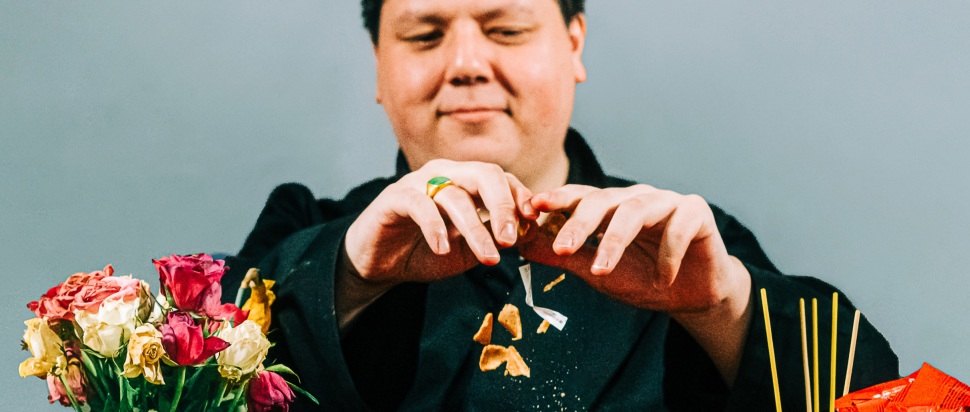Edinburgh Fringe 2024: Eating Theatre
Cooking is a demonstration of care, at once a balm and a bridge – we meet four theatre-makers bringing food-centred shows to the stage this August
Sierra Sevilla is recounting a potent childhood memory. She is 11 years old, sitting with her family in a tinned-roof house, while a super typhoon seethes outside. “I just remember the lights being off, us having candles, some torches. Mum was making us Spam.” Despite the fear that she felt at the time, she looks back on moments such as this with fondness. “I used to literally pray for storms to happen, so that I could have Spam. I loved it so much and Mum would only make it during a storm – in my head, I associated those two things.”
On moving to the States aged 18 to attend university, Sevilla was shocked to find that Spam was regarded with suspicion, and widely perceived as a ‘mystery meat’. She was shunned by her peers for cooking it, and often resorted to eating Spam in secret. Their scorn implied that she had historically enjoyed ready access to fresh food, which was not the case. The U.S. owns over 30 percent of Guam’s land (which is only 30 miles long and eight miles wide) and as a result, the island lost its ability to be self-sustaining.
As Spam is a U.S. product, Sevilla often questions whether its status as a cultural identifier indicates rebelliousness or submissiveness on the part of Guamanians. It is an idea that she explores at length in her show, For the Love of Spam, which is set to cause a scene at the Edinburgh Fringe this year. Sevilla’s husband’s aversion to Spam was a direct inspiration for the making of the play – as with her university cohort, she experienced his distaste as an affront. A rejection of some core part of herself.
Made in collaboration with her friend and director, Izzy Rabey, the show comprises myriad disciplines. Borne out of their shared personal experiences of colonisation (Rabey has Welsh heritage) and training in Applied Theatre, their combined approach seeks to break away from rigid structures of thinking. Here, audiences are invited to share the stage with Sevilla, share a meal, and embark on an act of liberation the likes of which the people of Guam have yet to experience.
Sean Wai Keung’s A History of Fortune Cookies is similarly generous in its design. What started as an attempt to contain the story of his grandparents (who previously owned a Chinese takeaway), soon turned into a fascination with fortune cookies, which are notable for being without a set identity, and no one place or time of origin. It is an echo of the Chinese takeaway – also representative of liminality. Neither Chinese nor Western, it exists someplace in-between.
The play sees Keung make and bake an array of fortune cookies for an intimate audience of ten. A meticulous 30 minute timeframe provides one part of a regimented artistic framework. The recipe Keung uses is simple – comprising flour, sugar, and water, he uses egg-replacement powder to complete the batter, eschewing whole eggs in favour of making the theatrical experience more inclusive. While he doesn’t practice veganism, or have any food-sensitivities himself, Keung is sensitive to flavour. “The whole point of food is community,” he says, and he sounds as if he is smiling.
The most chaotic part of the show involves folding the fortune cookies into their characteristic crescent shape. Keung is quick to leap to the overlap between restaurant culture and theatre here: “I’m really interested in hospitality,” he says. “It is such a caring thing. It takes so many shapes. When you are giving someone food, they have to feel safe with you, they have to trust you.” While Keung has never had any formal food training, he has always had a great passion for the art of cooking. He has never seen himself as a theatre-maker – rather, it is the connective possibilities of food that excites him.
There are few surviving records attesting to the genesis of the fortune cookie, and Keung sought to supplement his historical research with interviews. That the piece offers audiences the opportunity to choose between writing their own fortunes, or writing a fortune for someone else (imagined or otherwise) adds an element of freedom to his otherwise inflexible creative structure. The eating of the cookies provides an opportunity for nurture. “The act of feeding yourself can be a particularly intimate form of self-care,” he says. In our contemporary food climate, sweet treats in particular are maligned, often surrounded by stigma and shame. Keung notes the elitist, classist implications of this line of thinking, and he invites audiences to enter into his performance space with a more nuanced attitude.
As with For the Love of Spam, the relative ‘mysteriousness’ of the fortune cookie risks becoming a negative qualifier, proof of the deep-seated biases that exist around the cultures attached to it. When reckoning with the idea of ‘not belonging’, an empathetic approach is required. It is this practice of empathy that provides the backbone for Ugly Bucket’s Stuffed – here described not as a show about food, but about food banks.
In 2020, during the height of the pandemic, when the known world ended for a while, one member of Ugly Bucket took it upon themselves to volunteer at the Wirral Coronavirus Helpline. The service was stormed with calls relating to the distribution of emergency food, with people in varying states of financial crisis requiring regular and immediate assistance. “As a company that give platforms to social issues or to taboo topics, we felt this pull for this to be our next venture,” co-artistic director, Grace Gallagher, tells me.
The company embarked on a year-long research and interview process, recording hours of testimonials from food bank front-liners, before sampling their recordings into music. Ugly Bucket’s trademark physical vocabulary (which derives from practices of clowning), provides an additional theatrical layer. So far, the experience of making Stuffed has been reminiscent of their 2022 show, Good Grief, which examined bereavement. The company found audiences were often conflicted, caught between laughing and crying. “Stuffed feels similar,” Gallagher says. “Except the audience doesn’t know whether to laugh or scream.”

Stuffed. Image: Jack Ehlen.
During their Edinburgh run, the company has plans to engage in a weekly online discussion panel. They will also be giving out pamphlets after each performance, under strict instruction that these not be opened until the morning after. “If you come and see Stuffed, what we actually encourage audiences to do, is to do nothing. To leave, to have a rest, to sleep.” Inside the pamphlet, you will find several teabags. One is for you – the other serves as an invitation to share your newfound knowledge with someone else.
The pamphlet also outlines options for engaging with the cause, which can be tailored to fit one’s capacity. “There are some people who have more money. There are some people who have no money, but more time. And there are also people who have no money, no time, and there are still options.” The company encourages audiences to think deeply about their skills and the ways in which they can be applied to help make a positive difference – the overarching example being Ugly Bucket themselves.
That this company refuses to content themselves with pointing fingers, working instead to provide practical solutions, is as epic as it is refreshing. “It would have been far too easy, especially as a company from Liverpool, to make a show that just goes: FUCK THE TORIES FUCK THE TORIES FUCK THE TORIES, for an hour,” she pauses. “We really thought about that, and I think it would have been justified, but it also would’ve been too easy.”
Through making the show, and in speaking with as many service users and front-line workers as they have, the company realise that there is no one answer to solving this crisis. The task of the new Labour government is to operate in such a way as to enable material social change. The challenge for Ugly Bucket is to balance their fury with forward-looking movement. So, the company will also be taking food donations every day, and each item will be implemented onstage to help create the set. “It’s quite powerful for audiences,” Gallagher notes. “By the end, there’s this realisation that part of the solution has been there the whole time.”
Ugly Bucket will be working with the Edinburgh Food Project, amongst other food banks in the city, and donations will be divided equally among these partner organisations. Accessibility is key in Stuffed – as well as being captioned, audio description will be available at every show. Elements of sign-supported English will also be incorporated into the piece, and Gallagher hopes this will inspire other companies to do the same in the future.
My English Persian Kitchen also takes as its subject these dual themes of crisis and hope. Based on the true-life story of Atoosa Sepehr, and co-produced by the Soho Theatre and the Traverse, it was Soho’s Head of Theatre, David Luff, who approached Hannah Khalil to write the play. She was sceptical at first. “Initially, I was a little bit ambivalent,” she concedes. “I don’t have any connection to Iran; my heritage is Palestinian-Irish.”
After meeting with Sepehr and Luff on Zoom, Khalil was convinced. “The thing is, the show isn’t really about Iran. It’s about what it is to start again.” This is a story that Khalil knows well – after her parents divorced, her mother was forced to leave the Middle East for the UK to rebuild her life and community from scratch. And so, this is also a story that interrogates what it is to be two things. To occupy the here and the there, the now and the then, the native and the new.
While the story is told in both Farsi and English, food acts as the foremost means of communication in the play. Both Sepehr and Khalil taught themselves to cook in their later years, and for them, food remains a mode of transport, a fast track to the places they cannot travel to physically. Khalil goes on to describe the Persian noodle dish, Ash-e Reshteh. This was the last meal Atoosa had before fleeing an abusive marriage and, by necessity, her homeland. Khalil lists the necessary ingredients, cradling each image as she does so, loving them into shape, as one would a growing child.
Khalil is passionate about the potential for food as a conduit for love. Food is incredibly dynamic, and this fact feeds into the rhythms of the piece itself. “It’s not a talking-head play, it’s very physical,” Khalil confirms, referring, somewhat obliquely, to the set – here, a “deceptively domestic” kitchen space. She applauds the director and dramaturg, Chris White (who also happens to be her husband), and the play’s sole actor, Isabella Nefar. “She’s so focussed, so rigorous, so detailed…” Khalil trails off. “And she can cook!”
Soon, Khalil must disappear, away to the rehearsal room. But first, she offers one final reflection: “There’s a very Western idea that there’s this formula to playwriting, that there’s this recipe. I’ve always pushed against that. There’s something much more sensual about breaking those rules, that has softer edges, that meanders and flows, as opposed to adhering to a very strict structure.” Her willingness to push against artistic boundaries puts me in mind of Sepehr’s strength of character, and I say so. “Atoosa’s a really inspiring person,” Khalil says, firmly. “She really wants people to come away from the show, knowing that life can change. That you can change your life.”
For the Love of Spam, Pleasance Courtyard, 31 Jul-26 Aug, 2.10pm, £9-16
A History of Fortune Cookies, Summerhall, 1-26 Aug, 12.15& 12.50, £10-12
Stuffed, Pleasance Courtyard, 31 Jul-26 Aug, 2.25pm, £10-16
My English Persian Kitchen, Traverse Theatre, 1-25 Aug, £15-22.75
